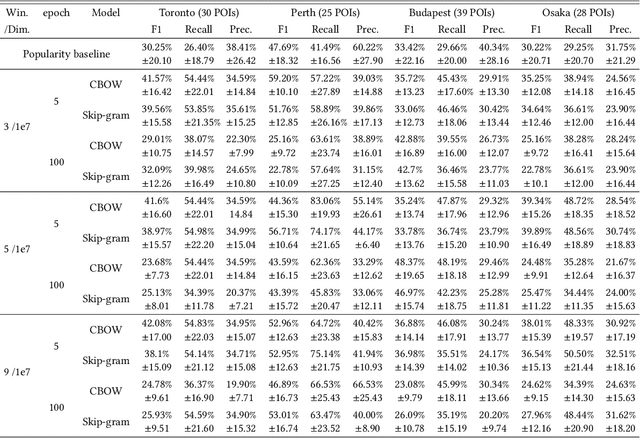Ngai Lam Ho
Utilizing Language Models for Tour Itinerary Recommendation
Nov 21, 2023Abstract:Tour itinerary recommendation involves planning a sequence of relevant Point-of-Interest (POIs), which combines challenges from the fields of both Operations Research (OR) and Recommendation Systems (RS). As an OR problem, there is the need to maximize a certain utility (e.g., popularity of POIs in the tour) while adhering to some constraints (e.g., maximum time for the tour). As a RS problem, it is heavily related to problem or filtering or ranking a subset of POIs that are relevant to a user and recommending it as part of an itinerary. In this paper, we explore the use of language models for the task of tour itinerary recommendation and planning. This task has the unique requirement of recommending personalized POIs relevant to users and planning these POIs as an itinerary that satisfies various constraints. We discuss some approaches in this area, such as using word embedding techniques like Word2Vec and GloVe for learning POI embeddings and transformer-based techniques like BERT for generating itineraries.
SBTRec- A Transformer Framework for Personalized Tour Recommendation Problem with Sentiment Analysis
Nov 18, 2023Abstract:When traveling to an unfamiliar city for holidays, tourists often rely on guidebooks, travel websites, or recommendation systems to plan their daily itineraries and explore popular points of interest (POIs). However, these approaches may lack optimization in terms of time feasibility, localities, and user preferences. In this paper, we propose the SBTRec algorithm: a BERT-based Trajectory Recommendation with sentiment analysis, for recommending personalized sequences of POIs as itineraries. The key contributions of this work include analyzing users' check-ins and uploaded photos to understand the relationship between POI visits and distance. We introduce SBTRec, which encompasses sentiment analysis to improve recommendation accuracy by understanding users' preferences and satisfaction levels from reviews and comments about different POIs. Our proposed algorithms are evaluated against other sequence prediction methods using datasets from 8 cities. The results demonstrate that SBTRec achieves an average F1 score of 61.45%, outperforming baseline algorithms. The paper further discusses the flexibility of the SBTRec algorithm, its ability to adapt to different scenarios and cities without modification, and its potential for extension by incorporating additional information for more reliable predictions. Overall, SBTRec provides personalized and relevant POI recommendations, enhancing tourists' overall trip experiences. Future work includes fine-tuning personalized embeddings for users, with evaluation of users' comments on POIs,~to further enhance prediction accuracy.
BTRec: BERT-Based Trajectory Recommendation for Personalized Tours
Oct 30, 2023Abstract:An essential task for tourists having a pleasant holiday is to have a well-planned itinerary with relevant recommendations, especially when visiting unfamiliar cities. Many tour recommendation tools only take into account a limited number of factors, such as popular Points of Interest (POIs) and routing constraints. Consequently, the solutions they provide may not always align with the individual users of the system. We propose an iterative algorithm in this paper, namely: BTREC (BERT-based Trajectory Recommendation), that extends from the POIBERT embedding algorithm to recommend personalized itineraries on POIs using the BERT framework. Our BTREC algorithm incorporates users' demographic information alongside past POI visits into a modified BERT language model to recommend a personalized POI itinerary prediction given a pair of source and destination POIs. Our recommendation system can create a travel itinerary that maximizes POIs visited, while also taking into account user preferences for categories of POIs and time availability. Our recommendation algorithm is largely inspired by the problem of sentence completion in natural language processing (NLP). Using a dataset of eight cities of different sizes, our experimental results demonstrate that our proposed algorithm is stable and outperforms many other sequence prediction algorithms, measured by recall, precision, and F1-scores.
POIBERT: A Transformer-based Model for the Tour Recommendation Problem
Dec 16, 2022Abstract:Tour itinerary planning and recommendation are challenging problems for tourists visiting unfamiliar cities. Many tour recommendation algorithms only consider factors such as the location and popularity of Points of Interest (POIs) but their solutions may not align well with the user's own preferences and other location constraints. Additionally, these solutions do not take into consideration of the users' preference based on their past POIs selection. In this paper, we propose POIBERT, an algorithm for recommending personalized itineraries using the BERT language model on POIs. POIBERT builds upon the highly successful BERT language model with the novel adaptation of a language model to our itinerary recommendation task, alongside an iterative approach to generate consecutive POIs. Our recommendation algorithm is able to generate a sequence of POIs that optimizes time and users' preference in POI categories based on past trajectories from similar tourists. Our tour recommendation algorithm is modeled by adapting the itinerary recommendation problem to the sentence completion problem in natural language processing (NLP). We also innovate an iterative algorithm to generate travel itineraries that satisfies the time constraints which is most likely from past trajectories. Using a Flickr dataset of seven cities, experimental results show that our algorithm out-performs many sequence prediction algorithms based on measures in recall, precision and F1-scores.
User Preferential Tour Recommendation Based on POI-Embedding Methods
Mar 03, 2021

Abstract:Tour itinerary planning and recommendation are challenging tasks for tourists in unfamiliar countries. Many tour recommenders only consider broad POI categories and do not align well with users' preferences and other locational constraints. We propose an algorithm to recommend personalized tours using POI-embedding methods, which provides a finer representation of POI types. Our recommendation algorithm will generate a sequence of POIs that optimizes time and locational constraints, as well as user's preferences based on past trajectories from similar tourists. Our tour recommendation algorithm is modelled as a word embedding model in natural language processing, coupled with an iterative algorithm for generating itineraries that satisfies time constraints. Using a Flickr dataset of 4 cities, preliminary experimental results show that our algorithm is able to recommend a relevant and accurate itinerary, based on measures of recall, precision and F1-scores.
 Add to Chrome
Add to Chrome Add to Firefox
Add to Firefox Add to Edge
Add to Edge